
-
 Japan startup hopeful ahead of second moon launch
Japan startup hopeful ahead of second moon launch
-
Ukraine allies to hold last defence meet before Trump takes office

-
 Myanmar military adopts anti-junta fighters' drone tactics
Myanmar military adopts anti-junta fighters' drone tactics
-
CES tech looks to help world's aging population

-
 Rubber tappers forge sustainable future in Amazon
Rubber tappers forge sustainable future in Amazon
-
US astronauts upbeat seven months into eight-day mission
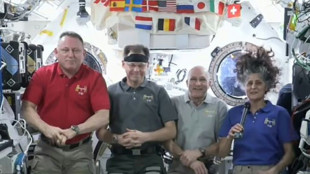
-
 Extreme weather, suburban sprawl fuel LA's wildfires
Extreme weather, suburban sprawl fuel LA's wildfires
-
Political chess or true beliefs? Zuckerberg's surprise Trump pivot

-
 US Fed officials concerned over 'stalled' disinflation, tariffs: minutes
US Fed officials concerned over 'stalled' disinflation, tariffs: minutes
-
Celebrities flee Los Angeles fires as Hollywood events scrapped

-
 Several US Fed officials concerned over 'stalled' disinflation: minutes
Several US Fed officials concerned over 'stalled' disinflation: minutes
-
US tech titans ramp up pressure on EU

-
 'Wicked' tops SAG Awards nominations
'Wicked' tops SAG Awards nominations
-
Safe from looting, Damascus museum reopens a month after Assad's fall

-
 Award-winning migrant actor earns visa to stay in France -- as a mechanic
Award-winning migrant actor earns visa to stay in France -- as a mechanic
-
Celebrities forced to flee Los Angeles blazes

-
 US tariff and inflation fears rattle global markets
US tariff and inflation fears rattle global markets
-
US private sector hiring undershoots expectations: ADP

-
 US tariffs unlikely to have 'significant' inflation impact: Fed official
US tariffs unlikely to have 'significant' inflation impact: Fed official
-
Lebanon leaders in talks for new bid to elect president

-
 Antarctic sea ice rebounds from record lows: US scientists
Antarctic sea ice rebounds from record lows: US scientists
-
Can EU stand up to belligerent Big Tech in new Trump era?

-
 US, Canadian and Australian travellers now face UK entry fee
US, Canadian and Australian travellers now face UK entry fee
-
Indonesia upholds iPhone 16 sales ban after Apple offers $1 bn investment
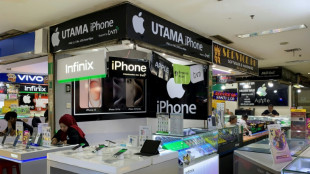
-
 UK's Catherine turns 43 hoping for better year
UK's Catherine turns 43 hoping for better year
-
OpenAI chief Sam Altman denies sister's sexual abuse accusations

-
 Germans turn to balcony solar panels to save money
Germans turn to balcony solar panels to save money
-
Samsung warns fourth-quarter profit to miss forecasts

-
 Brazil gears up for first climate conference in Amazon
Brazil gears up for first climate conference in Amazon
-
Iraqi archaeologists piece together ancient treasures ravaged by IS

-
 Big Tech rolls out the red carpet for Trump
Big Tech rolls out the red carpet for Trump
-
Former US president Carter lies in state after somber Washington procession

-
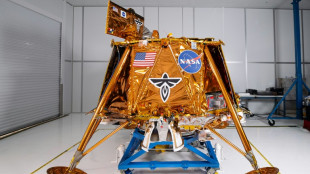 US company Firefly Aerospace to launch for Moon next week
US company Firefly Aerospace to launch for Moon next week
-
No proof fentanyl produced in Mexico, president says

-
 Biotech Startups Get a Boost: ZAGENO and Hatch.Bio Labs Partner to Streamline Lab Operations
Biotech Startups Get a Boost: ZAGENO and Hatch.Bio Labs Partner to Streamline Lab Operations
-
Mosquitoes with 'toxic' semen could stem disease spread: research
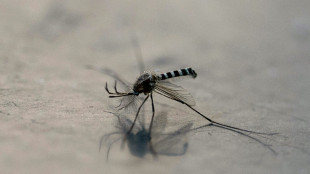
-
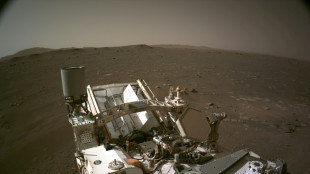 NASA eyes SpaceX, Blue Origin to cut Mars rock retrieval costs
NASA eyes SpaceX, Blue Origin to cut Mars rock retrieval costs
-
Invisible man: German startup bets on remote driver

-
 US urged to do more to fight bird flu after first death
US urged to do more to fight bird flu after first death
-
Inflation concerns pull rug out from Wall Street rally

-
 Frigid temps hit US behind major winter storm
Frigid temps hit US behind major winter storm
-
US trade deficit widens in November on imports jump

-
 Key dates in the rise of the French far right
Key dates in the rise of the French far right
-
Hundreds of young workers sue McDonald's UK alleging harassment

-
 Eurozone inflation rises, likely forcing slower ECB rate cuts
Eurozone inflation rises, likely forcing slower ECB rate cuts
-
Microsoft announces $3 bn AI investment in India

-
 French far-right figurehead Jean-Marie Le Pen dies
French far-right figurehead Jean-Marie Le Pen dies
-
Pope names Sister Brambilla to head major Vatican office

-
 Eurozone inflation picks up in December
Eurozone inflation picks up in December
-
Japan actor fired from beer ad after drunken escapade


Invisible man: German startup bets on remote driver
With no one in the driver seat, the SUV pulling up resembles an autonomous robotaxi like those becoming increasingly present in some cities -- but the car from German startup Vay is something else.
One of a number of emerging players aiming to disrupt road transportation, the seven-year-old company is built around remote driving, where a human is very much present, though sitting in an office using TV monitors to guide the car.
Over the last year, riders in Las Vegas have been able to test drive Vay, and the company was demonstrating its technology ahead of the Consumer Electronics Show (CES), the world's most important tech show.
Thomas von der Ohe, chief executive and co-founder of Vay, said his was a lower-cost approach "that has nothing to do with autonomous driving."
Von der Ohe, who previously worked at Zoox, the Amazon-owned autonomous driving company, said that unlike autonomous driving companies, Vay doesn't have to "run massive amounts of simulations" to be safe.
"Our core safety principle is that the (human driver) can make the decision," he said.
And unlike a Tesla or Waymo, there is no dream at Vay of one day shedding the steering wheel, which twists and turns during rides as if maneuvered by the Invisible Man.
The remote driving approach also employs fairly inexpensive camera technology, which costs a fraction of the envelope-pushing Lidar sensing systems favored by leading autonomous companies.
A demonstration of the remote driving technology showed someone watching three screens -- which included live imagery from front, side and rear-view cameras -- as they operated a system similar to at-home racing simulators, with a steering wheel and pedals.
Vay is offering rides for half the price of Uber or Lyft. Von der Ohe hopes to reach profitability in the next year or two, depending on how quickly the company can scale.
Since launching 12 months ago, Vay's Las Vegas fleet has grown from two to 30 vehicles, completing 6,000 rides, von der Ohe said.
But Von der Ohe believes the company's cash cow will not be ride-hailing, but the delivery of autos to consumers who then drive the vehicles.
In this way, Vay resembles a car rental company.
Since the launch in Las Vegas, some customers have ordered up Vay vehicles for home delivery and then driven them themselves.
That flexibility is one reason "we believe this can be a real alternative to private cars," von der Ohe said.
L.K.Baumgartner--CPN
